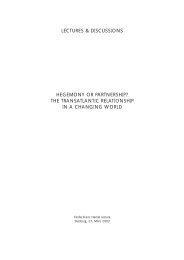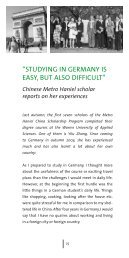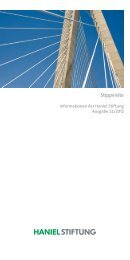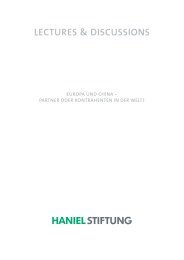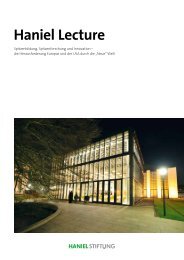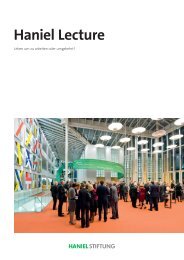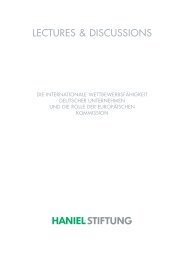Haniel Lecture 09 2010 E.pdf - Haniel Stiftung
Haniel Lecture 09 2010 E.pdf - Haniel Stiftung
Haniel Lecture 09 2010 E.pdf - Haniel Stiftung
You also want an ePaper? Increase the reach of your titles
YUMPU automatically turns print PDFs into web optimized ePapers that Google loves.
18 | Ronald Heifetz<br />
Without having multiple role anchors it would be easy for me to be<br />
swept away in what I came to call my own “zone of insatiability,”<br />
that vulnerability in me where, no matter what I might achieve,<br />
it was not enough. I risked creating my own internal hell by being<br />
unsatisfi ed with whatever I had achieved. This is not a prescription<br />
for happiness. To be pulled out of that whirlpool of insatiability, I<br />
found that I needed another role, another anchor of meaning. And<br />
in that sense my children became that anchor. (Now they are away<br />
at a university, and I am lost again!)<br />
In closing my remarks for this evening, I want to comment on the<br />
idea of measurement. I think we all want to be purposeful human<br />
beings. People want to do meaningful work, but people often<br />
become confused because we live in a world of measurement; and<br />
because we measure everything, we begin to buy into the myth of<br />
measurement. We begin to believe that measurement captures all<br />
truths, rather than serve simply as a device. Of course, measurement<br />
can be profoundly useful. In medicine we save lives every<br />
day because we can measure things like blood chemistries, cardiac<br />
rate, and oxygenation of the blood. You cannot run a business or<br />
any kind of enterprise without measuring as many parameters as<br />
possible to determine relative health, profi tability, and success.<br />
But measurement cannot capture the essential truths. I do not<br />
believe, for example, that you can measure the love that you give<br />
or the good that you do. I discovered this as a young man reading<br />
Shakespeare at Columbia University. Juliet declares her love to<br />
Romeo, “… the more I give to thee, the more I have …” Soon after<br />
reading that passage, I went to visit the renowned philosopher of<br />
science, Professor Ernst Nagel. When I asked him, “What questions<br />
are you asking?” he said, “I am interested in the uses and limits of<br />
measurement.” “Like Juliet,” I responded. “Exactly,” he said.<br />
The limits of measurement came home to me many years later<br />
when my father and mother were visiting my home in Boston during<br />
the holiday season of Halloween. My father is a neurosurgeon.<br />
He has invented many of the instruments that are used in brain<br />
surgery around the world and he has saved many thousands of<br />
lives in his career, directly and indirectly. (Indeed, one of the manufacturers<br />
of his instruments is nearby in Solingen.) When my<br />
father retired from medicine, he returned to a childhood hobby;<br />
he always loved astronomy – star-gazing. He decided he would<br />
introduce his grandchildren to the beauty of the heavens and he<br />
bought all of the books he could fi nd on astronomy. However, he<br />
did not like any of them. So he wrote his own book to introduce<br />
people to the stars. He sent it off to a publisher, Cambridge University<br />
Press, and they introduced him to a great illustrator in the<br />
Netherlands and they published his book, called “A Walk through<br />
the Heavens”, Cambridge University Press, 9.95 US-Dollar!



